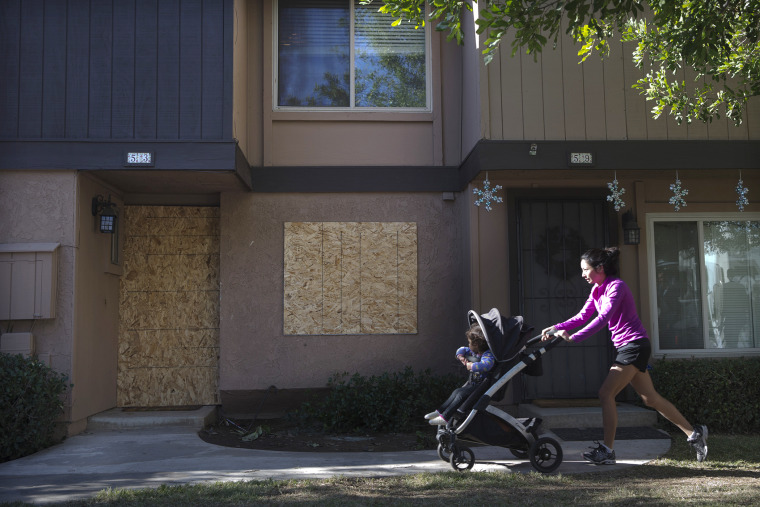What about their baby?
When Tashfeen Malik and Syed Rizwan Farook opened fire inside the San Bernardino Inland Regional Center on Dec. 2, their rampage yielded not only 14 dead and a nation still reeling, but a small, forgotten victim: their six-month-old baby girl.
Her name still unknown, their child, now an orphan, remains in the custody of San Bernardino Child Protective Services. Days after the shooting, Farook’s older sister, 32-year-old Saira Khan, petitioned for custody of her niece; the court will hold a hearing on her request next month.
This baby girl sits at the center of a potential legal whirlwind. On one side is something called Juvenile Dependency Court, which typically rules without fanfare on the fate of children who need protection from abusive or neglectful parents. On the other, the singular set of horrors committed by this particular mother and father, and a high-profile investigation that includes close scrutiny of their living relatives.
Given her parents’ carnage, will authorities allow this baby to grow up with her family, or will she be placed in a new one, perhaps with the improbable goal of starting over?
Had her parents died in an accident, the outcome in this case would be simple, family law experts tell MSNBC: The baby would be raised by her aunt.
“The basic outline of a case in which both parents of a baby die is not a rare event. When that happens and family members are willing to take custody, family members get custody,” says Scott Altman, a professor and family law expert at the University of Southern California School of Law.
California law is clear (if not so simply written): When a child is no longer under her parents’ custody, “preferential consideration shall be given to a request by a relative of a child for placement of a child with the relative.”
But before that can happen, even in a conventional dependency case, the law requires a judge and social workers to assess whether that relative is suitable. The law provides a straightforward checklist of logical attributes, including the “good moral character” of the relative and that relative’s ability to provide “a safe, secure and stable environment for the child.”
Lawyers call California’s inclination to place children with family “the relative preference.” But according to Andrew Cain, who supervises legal work in the dependency system for the Law Foundation of Silicon Valley, “that doesn’t mean the child will be automatically placed with a relative if [the relative] passes a few background checks. The court has to decide what is in the best interest of the child.”
The “best interest” standard is familiar in law, but can authorities reach a conventional decision in a case like this, with circumstances this horrifying, and tempers running at this high a pitch?
“Because this is being done in the public eye, the courts may act differently than they ordinarily would,” says Deborah Wald, a certified family law specialist and member of the Academy of California Adoption Lawyers.
In the end, it will fall to humans with subjective judgments to make a determination on the fate of the only child of parents who committed the most lethal terror attack on U.S. soil since Sept. 11, 2001. Will a team of social workers, court officials and lawyers in San Bernardino be able to agree on the outcome? In the words of David Donner, a family and juvenile court lawyer who specializes in custody matters, “this county has been traumatized by the event, which could impact how it assesses this minor’s best interests in determining an adoptive home.”
“In this case, the screening process will be done with particular care,” adds Wald, “because once the state takes custody of the child, it’s on the state if they make a mistake in the placement.”
Several lawyers, who are not involved in the case, cautioned that they’d seen nothing to suggest that Saira Khan would not make a fit custodian for her niece. But they didn’t stop there. With emotions rarely heard from lawyers talking on record, many experts made their sympathy for the orphaned baby passionately clear.
A main point of agreement was the hope that the baby would not only live with relatives, as the law encourages, but be raised as a Muslim. (The living family has asked that the baby be placed with a Muslim foster family until custody is resolved.) Those who might expect the baby could start over with what several called a “picket fence” placement — with a new, non-Muslim family — would be misguided, they said.
Cain said he would counsel Khan to prepare to tell child welfare officials whether, and how, she will explain what happened on Dec. 2 to her niece.
“Everyone must feel terribly sorry for this child, who will not only grow up without parents, but will grow up to learn what her parents did,” says Professor Altman.
Before she does, a California court will try to apply conventional rules to an unimaginable case, one where pure innocence abuts pure evil, and a life yet to be lived hangs in the balance.
Lisa Green is an MSNBC legal analyst and author of “On Your Case: A Comprehensive, Compassionate (and Only Slightly Bossy) Legal Guide for Every Stage of a Woman’s Life.”
